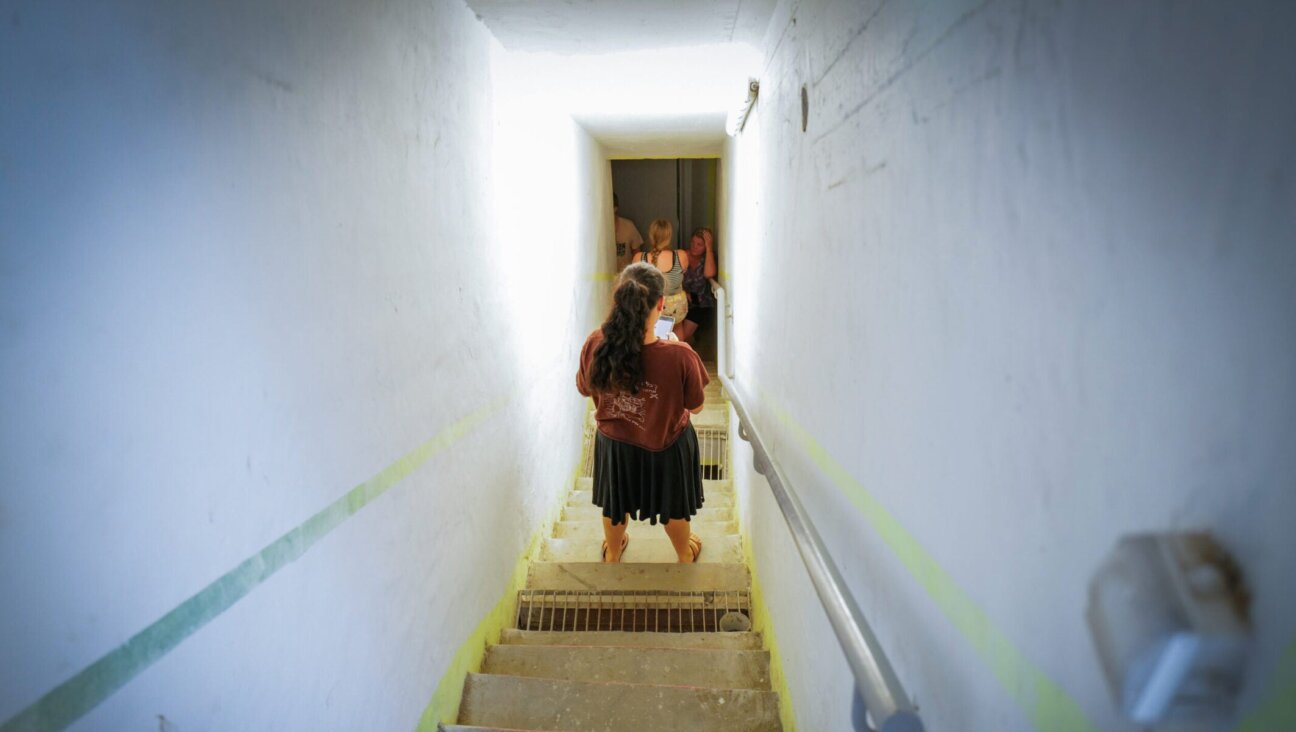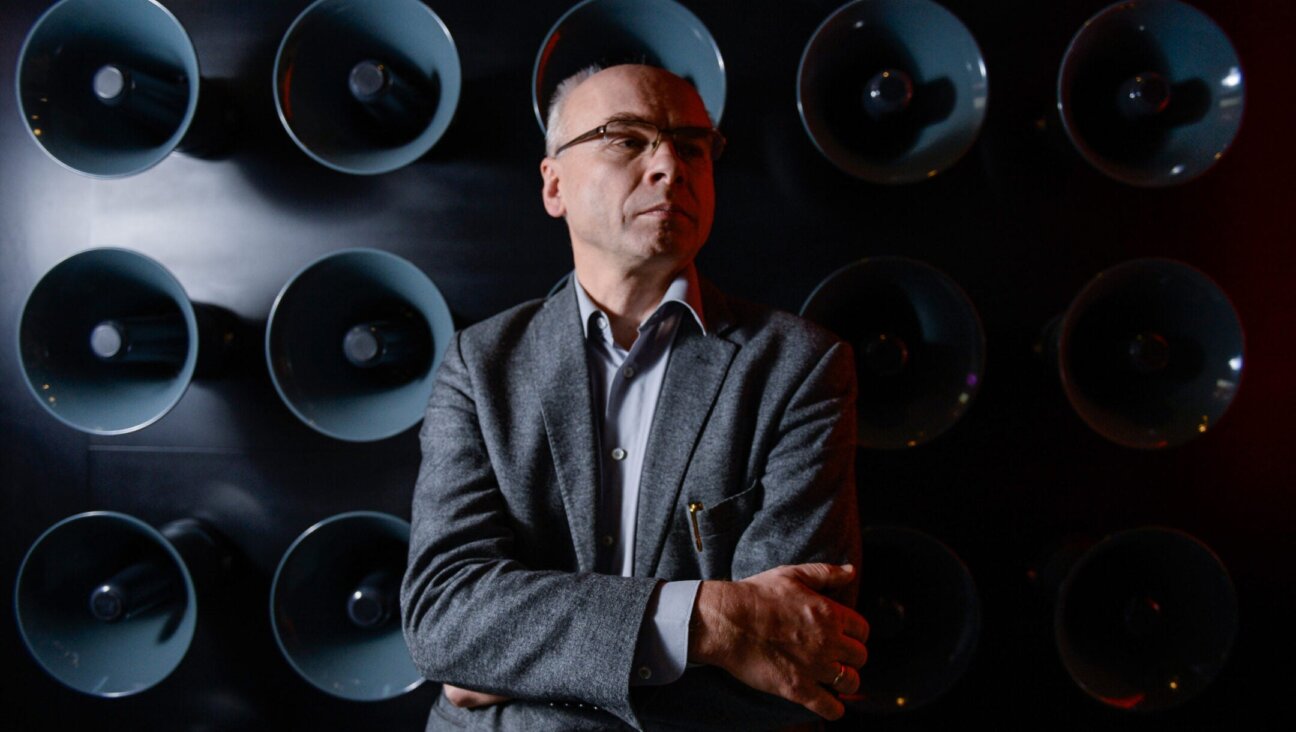Israel’s secret ‘Esther Project’: DOJ filings reveal paid US influencer campaign amid AI-powered PR blitz
As Netanyahu calls social media the “eighth front,” new documents reveal how Israel is paying to shape U.S. opinion

A man holds an Israeli flag as Pro-Palestinian protesters march through Manhattan near the United Nations as Israeli Prime Minister Benjamin Netanyahu addresses the United Nations General Assembly on Sept. 26. Photo by Spencer Platt/Getty Images
(JTA) — Newly filed records with the Department of Justice show that Israel’s government has quietly launched a two-track influence operation in the United States, blending big-budget political advertising with grassroots-style influencer campaigns.
The filings reveal that a firm called Bridges Partners LLC has been hired to manage an influencer network under a project code-named the “Esther Project.” It is unclear if there is any link to Project Esther, a plan to combat antisemitism published by the Heritage Foundation, an American right-wing think tank.
In its disclosure, required under the Foreign Agents Registration Act, Bridges said its work was intended to “assist with promoting cultural interchange between the United States and Israel” and specified that the engagement runs through a German division of the global PR firm Havas.
Attached documents show that the firm, owned by Israeli consultants Uri Steinberg and Yair Levi, was formed in June 2025 in Delaware and soon after received nearly $200,000 to recruit and coordinate U.S.-based social media influencers.
The contracts allow for up to $900,000 in payments over several months and include a detailed pricing schedule: $60,000 in upfront payments to cover influencer recruitment and concept development, another $140,000 in development-phase payments as five or six influencers began posting, and monthly allocations of up to $250,000 earmarked for influencer fees, production, and agency costs. A final $50,000 was budgeted for wrap-up and post-campaign reporting.
The filings also map out a phased rollout: three to six influencers onboarded at a time, each expected to post roughly 25 to 30 pieces of content per month across Instagram, TikTok, and other platforms. Later phases anticipated further expansion, including “matching with Israeli content partners” and developing partnerships with U.S.-based marketing agencies.
The documents also list payments to a range of contractors, suggesting the project was not just about paying influencers directly but about constructing an entire support ecosystem, including content production, legal compliance, and campaign analytics, to sustain the network over several months.
There is evidence that the work is already underway: Israeli Prime Minister Benjamin Netanyahu met with a group of influencers on Friday in New York City. When one asked him about how to win back declining support for Israel, he said, “We have to fight back. How do we fight back? Our influencers. I think you should also talk to them if you have a chance, to that community — they are very important.”
Netanyahu added, “We have to fight with the weapons that apply to the battlefields in which we engage, and the most important ones are on social media.”
The Bridges filings — unreported until now — add new information about Israel’s sweeping current diplomacy push, in what Israeli officials have taken to calling an “eighth front” in the country’s current war.
They complement a separate, larger deal that has drawn public attention this week: Israel’s $1.5 million per month contract with Brad Parscale, a former campaign strategist for President Donald Trump.
Filed on Sept. 18, Parscale’s firm Clock Tower X LLC registered as a foreign agent for Israel’s Ministry of Foreign Affairs, with Havas again serving as intermediary. The contract calls for “strategic communications” to combat antisemitism in the United States. Underlying documents reveal plans to deploy AI-driven tools: monthly SEO campaigns using the MarketBrew AI platform and efforts to shape outputs of GPT-based chatbots.
Parscale rose to prominence as Donald Trump’s 2016 digital director and later campaign manager, where he built a reputation for aggressive Facebook microtargeting of prospective voters.
Parscale’s Israel campaign promises to produce 100 ads or pieces of content each month, plus 5,000 different variations of those ads, a level of output that likely requires automated tools.
Bridge Partners, Parscale, Havas, and the Israeli government did not immediately respond to requests for comment.
Taken together, the filings show a multimillion-dollar push to saturate U.S. media and digital channels with pro-Israel narratives.
The effort emerges amid an unprecedented expansion of resources by the Israeli government to promote its views abroad. In December 2024, as part of coalition negotiations with Netanyahu, Foreign Minister Gideon Sa’ar secured a $150 million allocation for global public diplomacy, known in Hebrew as hasbara.
The allocation was about 20 times more than previous hasbara budgets, and the ministry started receiving the funds in May.
Israeli press described the funds as aimed at boosting digital outreach, foreign press briefings, and rapid-response messaging. Sa’ar called the investment essential, arguing that “Israel’s resilience abroad depends on winning the narrative battle.”
Since then, a number of initiatives have drawn attention. Last month, the organization Israel365, which seeks to stoke ties between Orthodox Jewish Israelis and evangelical Christians in the United States, brought up-and-coming “Make America Great Again” influencers from the United States to Israel. Israel reportedly paid the group $86,000 for the trip.
And the New York-based PR firm SKDK nabbed a $600,000 contract earlier this year to promote the stories of the Bibases, the hostage family whose mother and two young sons were killed in Hamas captivity and whose father, Yarden, was freed on Feb. 1. After the nonprofit news site Sludge, which covers money in politics, called attention to the contract earlier this month, SKDK said it was terminating the deal early — a potent sign of the risks facing firms that participate in Israel’s PR push at a time when its favorability is at record lows.
The latest filings appear to line up with real-world events, which have come with controversies of their own.
On Friday, during his visit to New York for the United Nations General Assembly, Netanyahu met with the group of U.S.-based Jewish influencers who have built large followings on platforms such as Instagram and TikTok for what was billed as a briefing on antisemitism.
Among those photographed at the meeting were Lizzy Savetsky, a fashion and lifestyle personality who has rebranded as a prominent voice for Israel; Ari Acker, who runs a popular news explainer account; and Zach Sage Fox, known for his pro-Israel video content. Other participants included Miriam Ezagui, a nurse who posts Jewish lifestyle content; and Joyce Chabb, a digital creator who has described her work as advocacy against antisemitism.
In reaction to the meeting, some social media users accused the influencers of prioritizing self-promotion through a photo opportunity with Netanyahu over solidarity with hostage families, who were also in New York at the time, demanding greater urgency from Israel’s leadership.
“These ‘influencers’ went running to a meeting straight into the arms of the people who have prevented deal after deal to bring home our sacred hostages,” wrote one user.
Expressing a feeling of betrayal, another user wrote, “My heart is broken to see Miriam Ezagui there. I am honestly speechless.”
Supporters, meanwhile, countered that the influencers were using their platforms to amplify concerns about antisemitism and Jewish unity at a time when online hostility against Jews has spiked.
“This kind of post actually proves how polarized we’ve become. Meeting the political leader of a democracy, even one we strongly disagree with, doesn’t mean endorsement. Dialogue, even uncomfortable dialogue, is how progress happens,” wrote one supporter.
Netanyahu did not release a transcript, but Israeli media reported that the conversation centered on strategies to “fight lies online” and to project a unified front in the Diaspora.
One of the influencers, Shay Szabo, echoed this framing in comments defending her participation. Szabo wrote that the goal was not to replace the work of hostage families but to strengthen Jewish advocacy in the digital arena. She also argued that, with Israel facing unprecedented scrutiny, “guilt-tripping one another only deepens the divide when what we need most is unity.”
The push to harness social media voices echoes advice Netanyahu received from a major American ally earlier this year. In May, several months before his assassination, conservative activist Charlie Kirk, head of Turning Point USA, sent the prime minister a private letter warning that Israel was “losing the information war” and needed a “communications intervention.”
Kirk argued that even within conservative and evangelical circles, Israel’s support was fraying, and he urged the government to treat narrative battles on social media and college campuses as seriously as military fronts.
Among his suggestions, Kirk called for elevating younger Jewish voices, sending released hostages on speaking tours in the United States, and investing in what he termed an “Israel Truth Network” to counter online disinformation.
“If this trend continues,” Kirk wrote, “Israel risks losing not only the next generation but the political cover it depends on in Washington.”

















